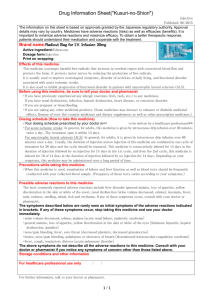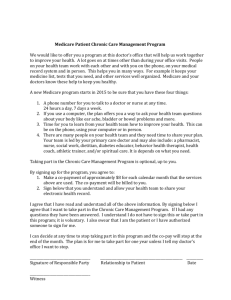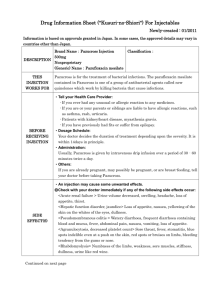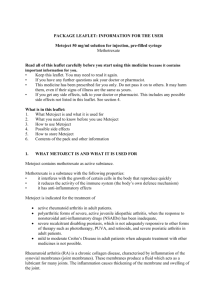Cerubidin_Injection
advertisement
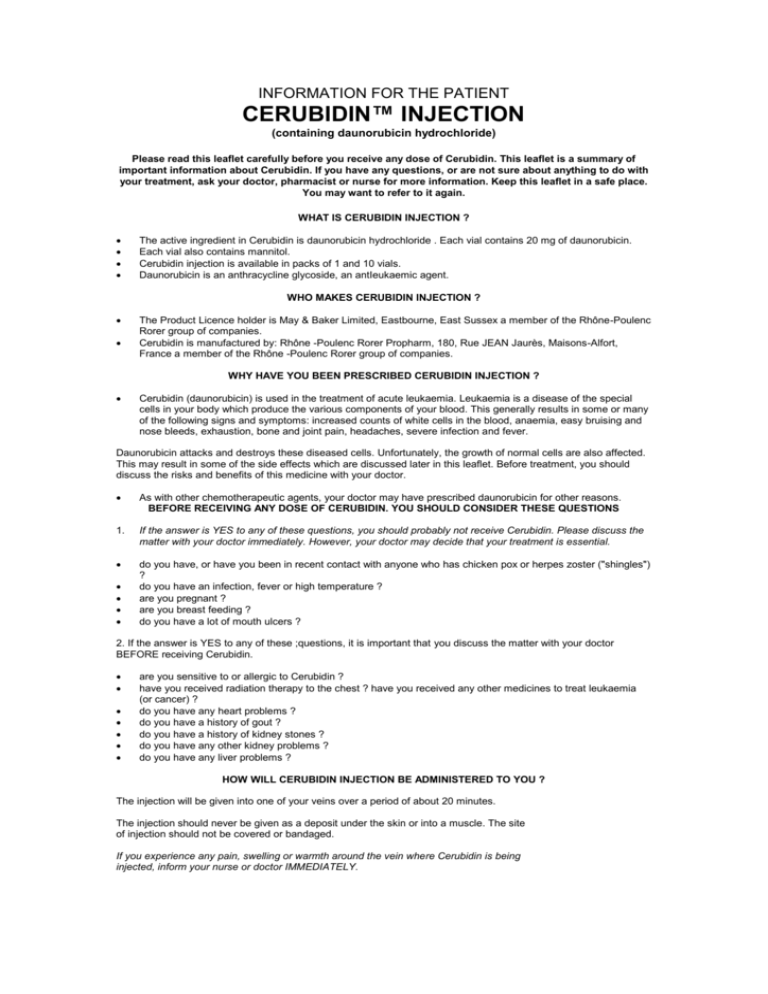
INFORMATION FOR THE PATIENT CERUBIDIN™ INJECTION (containing daunorubicin hydrochloride) Please read this leaflet carefully before you receive any dose of Cerubidin. This leaflet is a summary of important information about Cerubidin. If you have any questions, or are not sure about anything to do with your treatment, ask your doctor, pharmacist or nurse for more information. Keep this leaflet in a safe place. You may want to refer to it again. WHAT IS CERUBIDIN INJECTION ? The active ingredient in Cerubidin is daunorubicin hydrochloride . Each vial contains 20 mg of daunorubicin. Each vial also contains mannitol. Cerubidin injection is available in packs of 1 and 10 vials. Daunorubicin is an anthracycline glycoside, an antIeukaemic agent. WHO MAKES CERUBIDIN INJECTION ? The Product Licence holder is May & Baker Limited, Eastbourne, East Sussex a member of the Rhône-Poulenc Rorer group of companies. Cerubidin is manufactured by: Rhône -Poulenc Rorer Propharm, 180, Rue JEAN Jaurès, Maisons-Alfort, France a member of the Rhône -Poulenc Rorer group of companies. WHY HAVE YOU BEEN PRESCRIBED CERUBIDIN INJECTION ? Cerubidin (daunorubicin) is used in the treatment of acute leukaemia. Leukaemia is a disease of the special cells in your body which produce the various components of your blood. This generally results in some or many of the following signs and symptoms: increased counts of white cells in the blood, anaemia, easy bruising and nose bleeds, exhaustion, bone and joint pain, headaches, severe infection and fever. Daunorubicin attacks and destroys these diseased cells. Unfortunately, the growth of normal cells are also affected. This may result in some of the side effects which are discussed later in this leaflet. Before treatment, you should discuss the risks and benefits of this medicine with your doctor. As with other chemotherapeutic agents, your doctor may have prescribed daunorubicin for other reasons. BEFORE RECEIVING ANY DOSE OF CERUBIDIN. YOU SHOULD CONSIDER THESE QUESTIONS 1. If the answer is YES to any of these questions, you should probably not receive Cerubidin. Please discuss the matter with your doctor immediately. However, your doctor may decide that your treatment is essential. do you have, or have you been in recent contact with anyone who has chicken pox or herpes zoster ("shingles") ? do you have an infection, fever or high temperature ? are you pregnant ? are you breast feeding ? do you have a lot of mouth ulcers ? 2. If the answer is YES to any of these ;questions, it is important that you discuss the matter with your doctor BEFORE receiving Cerubidin. are you sensitive to or allergic to Cerubidin ? have you received radiation therapy to the chest ? have you received any other medicines to treat leukaemia (or cancer) ? do you have any heart problems ? do you have a history of gout ? do you have a history of kidney stones ? do you have any other kidney problems ? do you have any liver problems ? HOW WILL CERUBIDIN INJECTION BE ADMINISTERED TO YOU ? The injection will be given into one of your veins over a period of about 20 minutes. The injection should never be given as a deposit under the skin or into a muscle. The site of injection should not be covered or bandaged. If you experience any pain, swelling or warmth around the vein where Cerubidin is being injected, inform your nurse or doctor IMMEDIATELY. If you notice that your face is red while the injection is being given to you, tell your doctor or nurse immediately. This may be a sign that the injection is being given too quickly. Cerubidin solutions are bright red. This injection should always be given by a doctor or nurse. Never give it to yourself. HOW MUCH CERUBIDIN WILL YOU RECEIVE AND HOW OFTEN ? This will depend on your age, height, weight and your general medical condition. The usual dose for a person weighing 70kg ( 12 stone) is about 80mg. Your treatment schedule may be modified depending on your body's response. Cerubidin may be given alone or in combination with other medicines. Your condition will be closely monitored during treatment. This routinely involves blood and urine tests and heart monitoring (called ECG). Other medicines may be given during a course of Cerubidin to treat or prevent side effects. If you have any questions about your treatment schedule ask your doctor, pharmacist or nurse. DOES CERUBIDIN HAVE SIDE EFFECTS ? Medicines like Cerubidin can cause side effects. You should discuss them with your doctor who will explain the risks and benefits of your treatment Some of the side effects can be lessened or treated by other medicines or therapy. Although not all of these side effects may occur, if they do occur, they may need medical attention. Tell your doctor or nurse IMMEDIATELY If any of the following occur: pain, swelling or warmth in or around the vein where Cerubidin is being injected. facial redness while Cerubidin is being injected. This may be a sign that the injection is being given too quickly fever, chills or other signs of infection difficulty in breathing swelling of the feet or legs irregular or rapid heart beat black or tarry bowel motions vomiting blood or dark brown coffee-coloured granules any unusual bleeding or bruising Tell your doctor or nurse if any of the following, less serious side effects become troublesome. feeling or being sick diarrhoea skin rash sores in the mouth or on the lips WILL CERUBIDIN CAUSE YOUR URINE TO CHANGE COLOUR ? Cerubidin will cause your urine to turn red in colour for a couple of days after each dose. WILL CERUBIDIN CAUSE YOUR HAIR TO FALL OUT ? Medicines like Cerubidin often cause temporary loss of hair. After your treatment, normal hair growth should return. ARE THERE ANY LONG TERM SIDE EFFECTS ? After you have completed your course of treatment, you should tell your doctor, pharmacist or nurse IMMEDIATELY if you notice any of the following: difficulty in breathing swelling of the feet or legs irregular or rapid heart beat Like all medicines, Cerubidin may have unwanted effects which are very rare. If you notice any change in your health while receiving this medicine, or afterwards, tell your doctor, pharmacist or nurse immediately. EXPIRY DATE The expiry date can be found on the vial and on the box. Cerubidin injection should not be used after its expiry date. WHERE SHOULD CERUBIDIN INJECTION BE KEPT ? The vials should be kept at room temperature and protected from light. Reconstituted solutions of Cerubidin should be stored at between 2-8°C and protected from light. Keep them out of reach of children. CERUBIDIN is a trademark This leaflet was written May 1994 © 1996 Rhone-Poulenc Rorer
